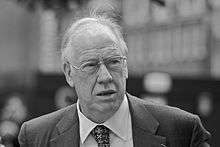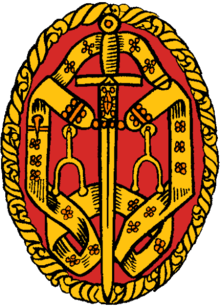Stuart Bell
| Sir Stuart Bell | |
|---|---|
 | |
| Second Church Estates Commissioner | |
|
In office 2 May 1997 – 11 May 2010 | |
| Prime Minister |
Tony Blair Gordon Brown |
| Preceded by | Michael Alison |
| Succeeded by | Tony Baldry |
| Member of Parliament for Middlesbrough | |
|
In office 9 June 1983 – 13 October 2012 | |
| Preceded by | Arthur Bottomley |
| Succeeded by | Andy McDonald |
| Majority | 8,689 (26%) |
| Personal details | |
| Born |
16 May 1938 High Spen, County Durham, England |
| Died |
13 October 2012 (aged 74) Middlesbrough, North Yorkshire, England |
| Nationality | British |
| Political party | Labour |
| Spouse(s) |
(1) Margaret Bruce (div.) (2) Margaret Allan |
| Religion | Church of England |
Sir Stuart Bell (16 May 1938 – 13 October 2012) was a British Labour Party politician, who was the Member of Parliament (MP) for Middlesbrough from the 1983 general election until his death in 2012.
Early life
Bell was born in County Durham in 1938, the son of a miner. He attended the Hookergate Grammar School on School Lane in High Spen near Rowlands Gill, Gateshead. He later attended the Durham Pitmans College. He joined the Labour Party in 1964, and was called to the Bar at Gray's Inn in 1970. He worked as an international lawyer in Paris until 1977, representing large multi-national companies. He contested Hexham at the 1979 general election, but was defeated by the Conservative MP and former Cabinet Minister Geoffrey Rippon.
Parliamentary career
Bell was elected to the City Council of Newcastle upon Tyne in 1980. In 1982, the Labour MP for Middlesbrough, Arthur Bottomley announced that he would step down at the next general election; Bell won the subsequent selection process to fight the seat at the 1983 general election. Bell comfortably held the seat, elected with a majority just short of 10,000 votes.
At Westminster, Bell became the Parliamentary Private Secretary to the Deputy Leader of the Opposition Roy Hattersley in 1983. He was promoted to the shadow frontbench in 1984 by Neil Kinnock as a Spokesman for Northern Ireland. However, he chose to resign his post after the Cleveland child abuse scandal which occupied two years of his life, after making unsubstantiated accusations of 'clinical error' against local paediatricians and child sexual abuse specialists. The paediatricians, Dr. Marietta Higgs and Dr. Geoffrey Wyatt, were later absolved and their forensic clinical work validated at a committee of inquiry overseen by Dame Elizabeth Butler-Sloss.
After the 1992 general election and the election of John Smith as the Leader of the Labour Party, Bell returned to the shadow frontbench as a spokesman for Trade and Industry. After the election of the Labour Government at the 1997 general election he was dropped from Labour's frontbench, but was appointed on the advice of Tony Blair as the Second Church Estates Commissioner, the spokesman for the Church of England in the House of Commons, a position he held from 1997 to 2010.
From 2000 to 2005 he was the Chairman of the Finance and Services Committee, which manages the annual budget of the House of Commons and its many employees. In 2005 he became a member of the Finance and Services Committee until 2008 when he served as chairman until 2010. Relatedly, from 2000 until 2010 he was a member of the House of Commons Commission, which oversees the administration of the House and the Members Estimate Committee that sets MPs' pay and pensions. He was a member of the Liaison Committee between 2000–10. He was a member of the Ecclesiastical Committee from 1997.
Bell sat on the Members Estimates Committee at Parliament and was heavily involved representing MPs' interests in the MPs' expenses scandal of 2009. He was a member in Speaker's Committee for the Independent Parliamentary Standards Authority between 2009–10. A founder member of the British-Irish Inter-Parliamentary Body, he was a Treasurer of the All-Party Parliamentary Group for the Promotion of First Past the Post.[1] and was Secretary of the Franco-British Parliamentary Relations Committee in the Commons. In February 2010 Bell was played by David Calder in the television film On Expenses.
Controversy
On 13 October 2009, he claimed on the BBC Today programme that the investigation by Sir Thomas Legg into the United Kingdom Parliamentary expenses scandal was marked by "retrospectivity", as Sir Thomas had changed the rules on expenses after MPs' claims had been submitted.[2]
In February 2011, it was revealed that Bell had not held a constituency surgery since 1997 in the feature film documentary ToryBoy The Movie[3] made by his political opponent John Walsh.[4] In September 2011, the Middlesbrough-based Evening Gazette newspaper began calling for an inquiry regarding Stuart Bell's apparent disregard for his Middlesbrough constituents. Journalist Neil Macfarlane claimed he had placed over 100 calls to his registered offices over several weeks, but the phone was never answered or calls returned. They claimed this was despite his wife receiving over £35,000 per annum allowance to act as his 'office' manager.[5] Bell later claimed that he had stopped surgeries after being assaulted, and was willing to meet constituents "by appointment". He stated that he would discuss the matter with Labour Chief Whip Rosie Winterton, and would be writing to Labour Party leader Ed Miliband to explain his circumstances.[6] Sir Stuart Bell did have a right of reply which appeared in the short film ToryBoy The AfterMath[7][8]
Other interests
Bell was a member of the French think tank, the Fondation pour l'Innovation Politique. He had been a prolific self-publishing[9] author, writing many short stories and novels in his later years, including a pornographic novel called Paris Sixty-Nine.[10] He was also a regular newspaper columnist for the Mail on Sunday and other publications.
Personal life

Bell was married in 1960 to Margaret Bruce and they had a son and a daughter. After his divorce, he married Margaret Allan in 1980 and they had a son.[11]
Honours
Bell was knighted in 2004 for his "services to Parliament" and was appointed a Chevalier of the Légion d'honneur, France's highest order, by President Jacques Chirac in 2006.
Death
Bell died on 13 October 2012 after a short battle with pancreatic cancer.[12]
Publications
- Bell, Stuart (1973). Paris Sixty-Nine. Consett/Ramsden Williams Publications.
- Bell, Stuart (1981). How to abolish the Lords. Fabian Society.
- Bell, Stuart (1988). When Salem Came to the Boro: The True Story of the Cleveland Child Abuse Crisis.
- Bell, Stuart (2000). Tony Really Loves Me. SpenView Publications. ISBN 0-9538638-1-6.
- Bell, Stuart (2002). Pathway to the Euro. SpenView Publications. ISBN 0-9538638-2-4.
- Bell, Stuart (2002). The Honoured Society. SpenView Publications. ISBN 0-9538638-4-0.
- Bell, Stuart (2002). Binkie's Revolution. SpenView Publications. ISBN 978-0-9538638-3-9.
- Bell, Stuart (2007). An Ever Closer Union. SpenView Publications. ISBN 0-9538638-5-9.
- Bell, Stuart (2007). The Ice Cream Man and Other Stories. SpenView Publications. ISBN 978-0-9538638-4-6.
- Bell, Stuart (2010). The Ice Cream Man and Other Stories (second edition). SpenView Publications. ISBN 978-0-9538638-4-6.
References
- ↑
- ↑ "MPs' grievance over expenses letters", BBC News, 13 October 2009
- ↑ http://www.toryboythemovie.com/
- ↑ Walters, Simon; Wilkinson, Paul (13 February 2011). "Labour veteran Sir Stuart Bell held voters surgery 14 years". London: Daily Mail. Retrieved 8 September 2011.
- ↑ "Are Teessiders getting enough from Sir Stuart Bell?". Gazette Live. Retrieved 8 September 2011.
- ↑ Fernandez, Colin (8 September 2011). "Is this Britain's laziest MP? Labour veteran who claims £83,000 for staff but hasn't held a constituency surgery for 14 YEARS". London: Daily Mail. Retrieved 8 September 2011.
- ↑ http://www.conservativehome.com/platform/2014/05/john-walsh-toryboy-the-aftermath-or-the-town-that-politics-forgot.html
- ↑ https://vimeo.com/86981668
- ↑ http://company-director-check.co.uk/director/906985577
- ↑ Walters, Simon; Wilkinson, Paul (13 February 2011). "Labour veteran hasn't held voters' surgery for 14 years: Mother is snubbed 40 times by MP who says 'I haven't let people down'". Daily Mail. London.
- ↑ Debrett's People of Today
- ↑ "MP Bell dies after cancer battle". Bradford Telegraph & Argus. 13 October 2012. Retrieved 13 October 2012.
External links
- Contributions in Parliament at Hansard 1803–2005
- Voting record at Public Whip
- Record in Parliament at TheyWorkForYou
- Profile at Westminster Parliamentary Record
- The Foundation pour l'innovation politique site (in French)
| Political offices | ||
|---|---|---|
| Preceded by Michael Alison |
Second Church Estates Commissioner 1997–2010 |
Succeeded by Sir Tony Baldry |
| Parliament of the United Kingdom | ||
| Preceded by Arthur Bottomley |
Member of Parliament for Middlesbrough 1983–2012 |
Succeeded by Andy McDonald |